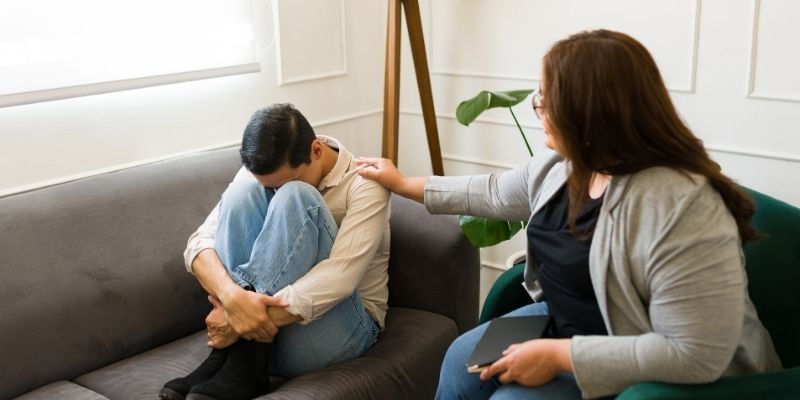Are You Noticing Red Flags in Your Relationships?
Advertisement
Trust is the key to a healthy connection, whether it's personal, professional, or romantic. When people trust each other, they can be open, emotionally connected, and vulnerable in their interactions. But when trust problems start to show up, they can quickly lead to misunderstandings, stress, and a loss of emotional connection.
It's important to find and fix trust issues early on if you want to build and keep good relationships. This article will talk about the most common reasons why people don't trust each other, how to spot them, and what you can do to rebuild mental trust.
What Makes People Lose Trust?

Trust issues dont just come out of nowhere. A lot of the time, they come from hurtful events, fears, or betrayals in the past. Let us look at a few of the most popular reasons:
Little Breakups in the Past
When someone betrays you, like when they lie to you or cheat on you, it can leave deep mental scars. These kinds of events can make it hard to trust other people in future relationships.
Experiences as a Child
Many people learn how to trust when they are young. As an adult, someone who grew up in a place where vows were broken often or emotional needs were not met might find it hard to trust others.
Fear of Vulnerability
Being vulnerable, or letting yourself be seen, is a key part of building trust. This might seem risky to some. Fear of being hurt, rejected, or judged can make it hard to trust.
Low Self-Esteem
When people don't believe in their worth, they might project that worry onto other people. If someone feels like they're "not enough" for their partner or friends, it can be hard for them to trust that other people are doing good things.
Trauma from the past
It can be hard to feel safe in relationships after going through a traumatic event like abuse, neglect, or loss. People who have been hurt in the past may be distrustful or overly alert because they are afraid of being hurt again.
Figuring out why trust problems happen is the first thing that needs to be done to fix them.
Signs That You Are Unable to Trust:

Trouble with trust can show up in several ways, but some of them are easy to spot. If you or someone close to you acts in these ways, it could mean that trust issues are going on:
Always suspecting others
People who have trouble trusting others often doubt what other people are doing or why they are doing it. For example, having a hard time believing your spouse when they are using the phone, or when they tell you something.
Having trouble opening-up
It can be hard to share ideas, feelings, or personal experiences if you're afraid of being open. This could show up as emotional walls, avoiding deeper conversations, or not wanting to talk about certain things.
Being jealous and possessive
Another red flag is possessiveness or unnecessary anger. There may be trust issues if someone is extremely wary or controlling when their partner is with other people.
Fear of Being Left Alone
A strong fear of being left or rejected can make someone clingy, need to be reassured all the time, or have emotional breakdowns.
Staying away from close connections
On the other hand, some people who have trouble trusting choose not to have any close ties at all. They might only talk about the regular things to keep from getting hurt.
Holding grudges
If someone has trouble trusting, they may remember hurtful things from the past for a long time, playing over and over in their thoughts. It's harder to trust new people when this is going on.
Having a Hard Time Forgiving
People who have trouble trusting others may not be able to forgive small mistakes or misunderstandings, especially if those mistakes make them feel even worse about their lack of trust.
The Effects of Lack of Trust on Relationships
Trust problems don't just hurt one person; they can also do a lot of damage to relationships. Without trust, it's hard to talk to each other honestly, feelings of closeness fade, and arguments get worse. Partners or friends may feel suffocated by accusations or jealousy, or they may pull away because they feel judged or not respected.
How to Fix Trust Problems and Make Relationships Stronger?
It takes time and patience to get over trust issues, but it is possible with the right method. If you're having trouble trusting someone or want to help someone you care about, here are some steps you can take:
Take a moment to recognize how you feel
Being honest with yourself is the first thing you need to do. Figure out what worries, fears, or bad events from the past are making it hard for you to trust. Forgive yourself for feeling weak; recognizing these feelings is the first step to getting better.
Talk to each other honestly and politely
Communication that is clear and honest is important for healthy interactions. Be honest with the people you care about, and talk about your worries, fears, and hopes. Say how their actions make you feel instead of accusing them of lying and then work with them to find answers.
Learn to forgive others
Holding on to hurts from the past can make it hard to trust in the present. Learn to forgive. Letting go of anger makes room for healing and connecting with others on an emotional level.
Have faith in yourself
Trusting other people comes after trusting yourself. Spend some time building up your self-esteem by recognizing your skills, setting goals for yourself, and celebrating your successes. Being sure of yourself can make trusting other people less scary.
Get help from a professional
If you have trouble trusting because of a traumatic event or long-lasting mental pain, therapy can be very helpful. A skilled counselor can help you deal with your trust issues by giving you advice, coping strategies, and support.
Patience
It takes time to rebuild trust; it doesn't happen fast. Pay attention to the little things you do over and over that make your relationships more honest, respectful, and safe for you emotionally.
Final Thoughts
Trust is the key to making real connections with other people. By learning about the reasons and signs of doubt, you can take steps to fix the problem and build stronger relationships.
Trust issues can be solved on your own or with someone else. Just remember that progress is made over time by making small, steady efforts. Tell the truth about your fears, encourage open conversation, and learn to forgive. You can rebuild trust and build relationships that are strong and satisfying if you are patient and don't give up.
On this page
What Makes People Lose Trust? Little Breakups in the Past Experiences as a Child Fear of Vulnerability Low Self-Esteem Trauma from the past Signs That You Are Unable to Trust: Always suspecting others Having trouble opening-up Being jealous and possessive Fear of Being Left Alone Staying away from close connections Holding grudges Having a Hard Time Forgiving The Effects of Lack of Trust on Relationships How to Fix Trust Problems and Make Relationships Stronger? Take a moment to recognize how you feel Talk to each other honestly and politely Learn to forgive others Have faith in yourself Get help from a professional Patience Final ThoughtsAdvertisement












